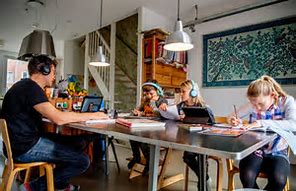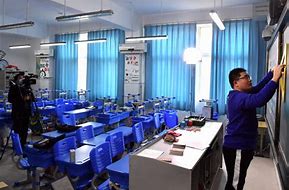For centuries, formal education has been administered through traditional classrooms. Even now, by the time children enter university or even high school, they have been “sentenced” to hours upon hours of classroom content with little exposure to experiences that relate to what, and perhaps more important, why they learn. While there has been a shift to experiential learning through methods such as the flipped classroom (replacing lectures with collaborative peer-to-peer engagement), COVID-19 has likely forever changed the way we educate.

Today, students are receiving their academic content at home. It is becoming more fluid each day and both parents and children are growing accustomed to it. If schools do not pivot now, they risk becoming redundant given what the world has just discovered from the comfort of home — the potential of online learning. Nevertheless, society revolves around school to give our families structure, from planning each day to scheduling vacations. This likely will not change; however, school choice may become more relevant with a broader array of options. While educational leaders need not completely reinvent the wheel, an honest look in the rear-view mirror to identify what is now missing would be prudent.
“I hear, and I forget. I see, and I remember. I do, and I understand.”
Ancient Chinese proverb
Due to greater demands of modern society and the speed of change accelerated by COVID-19, experiential learning is the essential ingredient missing today. Unfortunately, it has been underutilized and declined even before now. Band, art class, physical education, recess, and other predominantly school-related experiences are often the first ones cut from education budgets. Ironically, these subjects are now essential to a schools’ success. They will be what students have missed most when they return. Like a “mom and pop” retailer versus Amazon.com, brick and mortar always has value if positioned appropriately. When you provide what the internet cannot, “customers” will come to you for almost everything.
The creator of Experiential Learning Theory (ELT), David Kolb, defined the “process whereby knowledge is created through the transformation of experience.” Kolb further pointed out that an effective learner is a person who thinks, feels, perceives, and then behaves. Real experiences expose students to the potential for exercising all their senses in a far greater measure than traditional classroom experiences.
I often tell my keynote audiences that being the guitarist of Hanson was equivalent to attending the “Harvard Business School of Rock and Roll.” Furthermore, I share that “Someone taught me trigonometry in grade school, but I actually learned it in the cockpit of an airplane while learning to fly…and I didn’t even know it was trigonometry.” Not every student can partake in such activities, but most schools have enough resources to sufficiently simulate these environments. A ground school syllabus accompanied by a flight simulator program can be installed on any classroom computer, and a music class can integrate with school functions in a way where student bands can be coordinated, managed, booked, and promoted.
Future-Ready Employees
While the entire world is currently experiencing the decentralization of knowledge, hands-on experience is also important because new hires can hit the ground running. Orientation and transition time to adapt to “real life” circumstances are reduced, creating a significant benefit to any company. While this should also help employee retention, it will surely facilitate the process of recruiting. As reported by eLearning Industry, experiential learning provides:
- Accelerated student learning
- A “safe” learning experience where learners can make mistakes without repercussions
- A bridge between lectures and actual practice
- A change in mindset
- An increase in engagement
- A more potent return on the student’s investment in education
- Assessment results that are both more accurate and less subjective
- More personalized learning when it is hands-on rather than as a crowd-directed lecture
Such experiential opportunities develop “soft skills” by learning to manage stress and resolve conflict which makes for more efficient and desirable employees. This is the number one complaint of businesses recruiting employees — the lack of soft skills. A collaborative environment fosters social-emotional, cultural competence, responsibility, creativity, social skills, and more.
Where to Begin
For students, it is not just what is taught but also how and where. Consider using outdoor classrooms to better connect with nature, comfortable and moveable furniture to facilitate group learning and a variety of situational activities, expanded sports facilities, quality music instruments and art supplies, and other things that cannot be easily reproduced at home.

On a grander scale, consider a physical space that looks more like a work of art than a jail to foster the joy of learning. Schools can build-in passive learning opportunities in addition to active ones. For example, buildings designed to achieve “net-zero” energy efficiency and use geothermal HVAC system (like Bluestone Elementary School in Harrisonburg VA) can literally expose these technological achievements for every student to see daily, stimulating their imagination and creativity in ways that will help them be relevant in an evolving job market.
At the same time, this must not be an effort to lure children away from home. Family engagement is critical to a child’s success, and the opportunity to engage parents has arrived because they are now primed to take a more active role (such as doing daily homework with children) thanks to the coronavirus containment efforts. This interest can be sustained, harnessed, and transitioned into a normal part of education even once students return as long as opportunities for parents to participate are increased and communication between school and home remains more frequent.
The world has more to teach than the classroom and it always will, but the classroom must be the place to teach students how to extract and absorb the lessons of the world. While the role of delivering knowledge may no longer primarily belong to schools, the opportunity to facilitate each student’s interaction with his or her forever-evolving environment is paramount.

